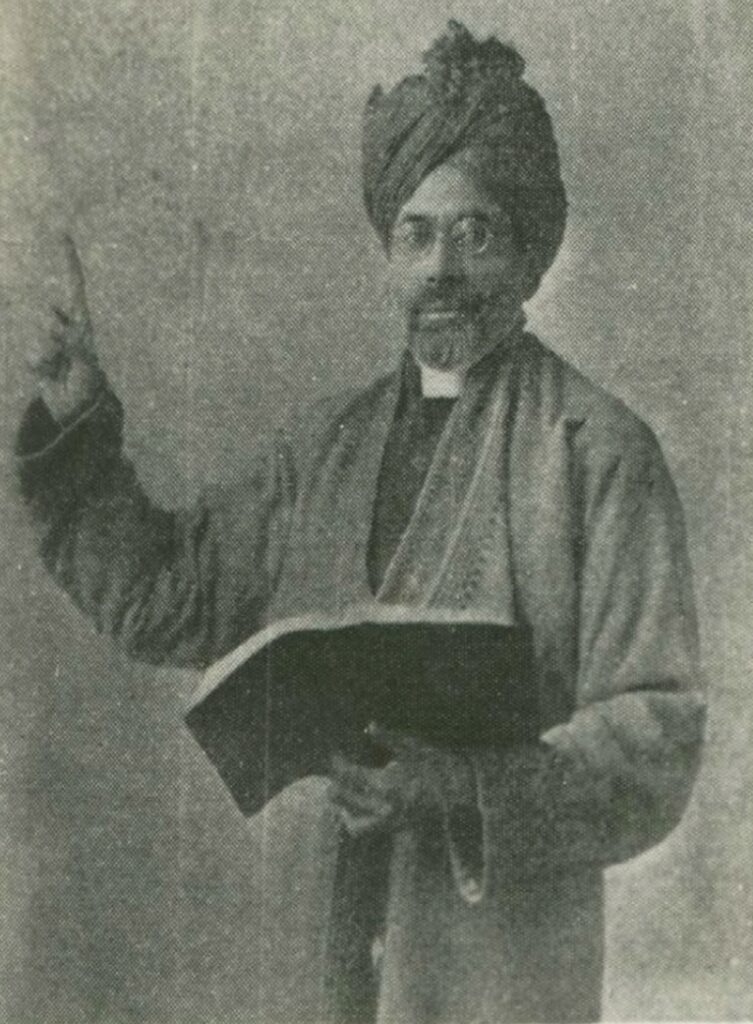Al Fazl, 7 & 10 November 1921

Hazrat Maulvi Abdur Rahim Nayyarra (1883-1948)
Difficulties during tabligh
ہوتے ہیں بہت رنج مسافر كو سفر میں
آرام نہیں ہے كوئى دم آٹھ پہر میں
[“A traveller faces many sorrows during a journey. There is no time for him to rest on any given day.”]
Along with hours of joy and happiness comes the time of troubles and difficulties and they are destined to come so that all the impurities can be removed from the soul of a person. I will only share the story of a single day.
Nowadays, we have our own car [motor] for our mission because spending 75 rupees a day was out of the question. We have thus taken a car on mortgage for 1,000 rupees. We have hired a driver for 75 rupees monthly and a helper for 37.5 rupees per month. Apart from them, we have hired a cook and a servant for 75 rupees monthly.
All the said staff was going on a tour with me in a car when the car broke down. Therefore, I had to leave all the staff and continue my journey alone on a hired lorry along with a servant.
On the way there was a river and the lorry had to cross it by passing over a line of boats forming a bridge. The rope of the bridge had been broken. The fishermen refused to fix the bridge. I gave a sermon that softened them and they brought ropes from the village and helped us cross over [the river]. However, the lorry then got stuck in the mud. Just as the landlords in Punjab pull the two-wheeled carts out of the mud, in the same way, I had to take part in pulling the lorry out. Then came a stream along the way and the wheels of the lorry got stuck in its current. It was a critical time because there was a risk of flooding at every passing moment. A group of passengers came and solved that problem.
Then came a path where I had to walk. Three miles in Africa are equivalent to 5 to 6 miles in India, or so they seem because I have gone old. There was no food and I was intensely hungry. My body was hurting due to fatigue and I was sweating profusely.
I finally completed that difficult path and after reaching the destination, I ordered tea. I asked the servant to open the small box of biscuits. The box was opened with great eagerness and I was expecting that Isa [the servant] would give me some biscuits, but instead of biscuits, that box had other items, i.e. boot polish, boot brush, tooth powder, toothbrush etc. Nothing else was available over there.
In the said situation, I recited that couplet which has been mentioned at the outset and then resolutely left for the speech. There was no strength in my body, but if courage, perseverance and conviction are present in a person, then Allah the Almighty grants strength. I stood up to deliver the speech. There was no interpreter. Unfortunately, my interpreter could not come along that day. I solved that problem in such a way that Isa stood on one side and an English-speaking young man like that of the cantonments stood on the other side. I spoke some Arabic and a little bit of English and conveyed the message with the help of both interpreters. My interpreters had to consult each other on several occasions to translate. In that very state, I remembered the opponents of Ahmadiyyat, especially Sanaullah, and I pitied them.
Above is a page from the chapter of difficulties faced by a missionary, but true faith always brings blessings and I have been granted a fair share from this grace on every occasion. When the said difficulties became unbearable, and at a time when I had been fully exhausted, I opened my bag. It had lemon juice, a piece of cake from England and almonds, which had accidentally been left in the bag. Readers can imagine for themselves as to what I felt at that time and what went through my mind when I received this unexpected bounty. I only say, all praise belongs to Allah, Lord of the worlds.
Summary of news from Nigeria
The vice president of Anjuman Ahmadiyya [Nigeria] writes:
“I am not at all reluctant to assure you that you have left a healthy jamaat. It has the effect of your magnetic force that is present in a heart which has sincerity and love for the truth. It is certainly the effect of that power. It is not merely the effect of persuasive eloquence and logic; the jamaat is truly faithful and willing to give up its life for the heavenly message.”
The secretary writes:
“The proposals put forward by Majlis Nazim have been endorsed by Majlis Akabir with great enthusiasm and administration has been given complete freedom in financial matters. Below are the proposals:
1. The funds of new and past jamaats should be combined and the amount of 80 + 60 = 140 pounds present in the bank should be combined.
2. In future, a committee should monitor the chanda collected in the Jami‘ masjid [central mosque].
3. Every month, each man should contribute one shilling in chanda and each woman should present six pence. In future, a committee should collect Zakat every year.
4. A salaried servant should be hired for the Jami‘ masjid.
“A suggestion for an immediate collection of 1,000 pounds is under consideration. It is intended to hold a general conference of members of the jamaat. The process of ascertaining the exact number of members affiliated with each mosque will be done before the collection of chanda. The current state of affairs is encouraging. It is proposed to launch the school as soon as possible. The Wednesdays’ lectures at Campus Square and Sundays’ lectures at Ahmadiyya Hall are being held on a regular basis.”
In the rest of the letters [I have received], there is mention of the zeal and reformation of women. The day is not far when Nigeria will absolve India of the responsibility of expenses of foreign missions, insha-Allah, and a Bilal will reach India to convert the likes of maulvis of Amritsar to Islam, insha-Allah.
وہ گھڑى آتى ہے جب عیسىٰ پكاریں گے مجھے
اب تو تھوڑے رہ گئے دجال كہلانے كے دن
[“The time is nigh when they will start calling me Jesus. The days are few in being called the Antichrist.”]

Al Fazl, 10 November 1921
مورا چین گیا مورى نیند گئى
[I am restless and I can’t sleep.]
A week’s partial rest at Saltpond after Lagos’ hectic schedule has resulted in an overflow of thoughts and sharpness of mind. The clear sky of Africa looks like a dome-shaped tent on my head and the shining stars look very charming on it. They are beautifully serving as an adornment for the ceiling. Remembering the stars today, my restless heart is talking and the following couplet, which passed through my eyes some years ago, is involuntarily coming out of my mouth:
تم بھى ہو تارے ہم بھى ہیں تارے
تم ہو سما كے ہم ہیں زمین كے
[“You are stars, but we are also stars. You are stars of the sky; we are stars of the earth.”]
In this state of ecstasy and delight and in such a state of mind, on the one hand, the ocean is making a lot of noise today and on the other, the Hausa girls and boys are playing desert drums and trumpets as is done in the villages of Punjab. They are playing them with such force that Al-Aman [God have mercy on us], and their dancing and shouting together with the noise coming from their place is not only pushing the sleep away from the eyes but also from the premises of the house. In this situation, if something is keeping my restless and sleepless soul busy and happy till the end of this noise, then they are the following several couplets. These [couplets] remind me of my days spent in Akona and Purab [territory between the western borders of Awadh and the eastern borders of Bihar, India], and bring to mind the time of my beloved [the Promised Messiahas]. They draw my attention towards the era of the books written by “Krishan Avatar” [the Promised Messiahas] and “Krishan Leela”, and also bring to the fore the difficulties faced during tabligh:
میرے سر میں جنوں ہے دل میں جلن
مورا چین گیا مورى نیند گئى
مجھے آتا ہے یاد وہ سیمین بدن
مورا چین گیا مورى نیند گئى
[“My mind is full of passion and my heart is burning. I am restless and I can’t sleep. I recall that beautiful body [of the Promised Messiahas] and I become restless and I can’t sleep.”]
ہائے وہ بھى تھے دن جب دیکھتے تھے ہم
وہ اپنا صنم وہ اپنا بلم
جب یاد وہ آیا مسیحِ زمن
مورا چین گیا مورى نیند گئى
[“Alas, those were the days when we used to witness our beloved and our sweetheart. When I remembered the Messiah of the time, I became restless and I couldn’t sleep.”]
ترى یاد میں آنكھوں سے اشك بہے
ترے ہجر میں ہوش و حواس گئے
ترى دید كى دل میں لگى جو لگن
مورا چین گیا مورى نیند گئى
[“My eyes welled up with tears when I remembered you. I lost all awareness and senses from your parting [from the beloved]. When that desire arose in my heart to see you, I became restless and I couldn’t sleep.]
ترے نور سے ڈھارس من كو ملى
ترے دین سے طاقت تن كو ملى
رہى تیرى جدائى ہمیشہ كٹھن
مورا چین گیا مورى نیند گئى
[“Your light (Khalifatul Masih Irh) has given courage to my heart. Your religious conviction has granted strength to my body. Your separation was always hard on me. I am restless and I can’t sleep.]
تیرے لخت جگر كى صورت ہے
محمود كى موہن مورت ہے
ہائے وہ بھی ہے دور، ہے دور وطن
مورا چین گیا مورى نیند گئى
[“We have the countenance of your dear child in the form of charming Mahmud (Khalifatul Masih IIra). Alas, he is also far away; far too is that land (Qaidan). I am restless and I can’t sleep.”]
تیرے ہجر میں دیس بدیس پھرى
كھلے كیس بدل كے میں بھیس پھرى
كئے وصل كى خاطر سارے جتن
مورا چین گیا مورى نیند گئى
[“I wandered from country to country in your separation. I roamed around with open hair and in different disguises. I put in all this effort to achieve Your nearness. I am restless and I can’t sleep.”]
مرے مولا اكیلى میں بندى ترى
مرے سامنے رن میں ہے فوج پڑى
میرا دشمن بل پہ ہے اپنے مگن
مورا چین گیا مورى نیند گئى
[“My lord, I am your lone servant and in front of me is an army on the battlefield. My enemy is taking pride in their power. I am restless and I can’t sleep.”]
میرى بیّاں پكڑ كے گلے سے لگا
میرے سینے سے سینے كو اپنے ملا
ہائے جلتى ہے سینے میں برہا اگن
مورا چین گیا مورى نیند گئى
[“(My Lord), Grab my arms and hug me. Squeeze my chest with Your chest. Alas, the fire of separation burns in my chest and I become restless and I can’t sleep.”]
تیرا نیّر خستہ جگر ہے جہاں
اسے جنگ ہے برّ سے بحر سے واں
لیجو اس كى خبر تورے لاگى چرن
مورا چین گیا مورى نیند گئى
[“Where Your Nayyar is weak of heart, there he is at war with the land and the sea. Please take care of Your humble servant; I have fallen to your feet. I am restless and I can’t sleep.”]
From Abdur Rahim Nayyar.
(Translated by Al Hakam from the original Urdu in the 7 and 10 November 1921 issue of Al Fazl)

